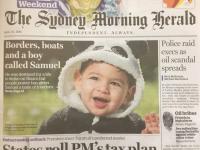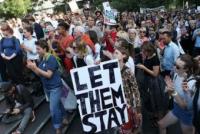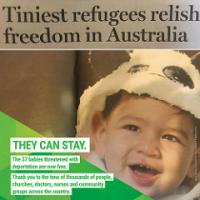People power – activism by tens of thousands of people – has forced the conservative Australian government to keep 37 babies and children and their parents in mainland Australia instead of sending them back to cruel detention centres on foreign prison islands as planned. "This is a victory for people power, in the form of the Let Them Stay campaign waged by the advocacy organisation GetUp! and the Melbourne-based Human Rights Legal Centre," commented Michael Gordon, political editor of The Age newspaper published in that city.
GetUp!, which claims more than a million members, sent around the front-page photograph because they “thought you'd like to see Samuel's happy face splashed across today's newspapers”.
“I want you to know that your donation made this possible. Thank you,” supporters were told.
Doctors, nurses, community workers, dozens of organisations across the country, churches and religious leaders took part in the “let them stay” campaign. Some stood guard outside a Brisbane hospital to prevent immigration agents snatching a baby that had been treated there. People offered to put up refugees in their homes.
Activists are worried about 148 other people still threatened with deportation to Manus Island and Nauru and more than 1,500 trapped on the prison islands.
“It’s clear that the overwhelming majority of Australian people know that we are strong enough to welcome those who seek our help, and share with them the safety and opportunity that we have here in Australia,” commented The Greens party, which also drove the activism.
With more than half the 267 asylum seekers who were receiving medical treatment in Australia, including all families, now granted community detention, refugee advocates have labelled the campaign a success, although the Human Rights Law Centre lost a High Court battle, which has found the federal government's offshore detention regime at Nauru and Manus Island lawful.
The centre's director of legal advocacy, Daniel Webb, said he thought the government would act quickly by returning a group of asylum seekers who had travelled to Australia temporarily, many for medical assistance.
The group included 37 babies born in Australian jurisdiction, 54 children, many of whom were going to school in Australia, and parents.
"I think the Government has listened. As disappointing as that High Court decision was, the public response to the plight of these people has been incredible," said Webb. GetUp! human rights campaign director Shen Narayanasamy sees community sentiment shifting in favour of refugees.
"There was unprecedented support. You saw over 100 churches declare that they would defy the federal government and offer sanctuary to these people," Ms Narayanasamy said.
"And I think when you have people like the churches and the doctors and others standing up — everybody from all walks of life — the government really does have no choice but to listen to that overwhelming sentiment."
But Mr Webb said the situation is not ideal for the asylum seekers, who are unable to work and have no idea about their future. He wants the government to provide certainty.
"These families are by no means out of the woods yet. They are still at risk of deportation back to harm. Their hope and our hope is that their release into the community suggests that they're on a different pathway, that actually our government is going to treat them with decency and respect and allow them to begin rebuilding their lives right here."
But a spokesman for Immigration and Border Protection Minister Peter Dutton said on national radio that the asylum seekers are in Australia because some are still receiving medical treatment and legal proceedings are ongoing. Dutton's spokesman said they will all return to Nauru once their matters have been resolved.
A national election is expected in Australia in July.
See also A refugee mother's thanks to Australian activists



